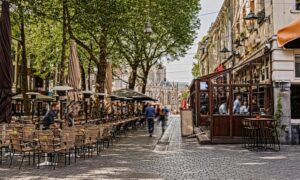The Dutch city of Breda has recently been named winner of the 2019 Access City Award. Breda in the south of the Netherlands was an important hub during the Roman Empire, meaning small streets and cobblestoned roads – while this is part of its charm, it’s not great for disabled residents or disabled travellers visiting the city.
Scope estimates that the cost of living for disabled people is, on average, £583 a month higher than non-disabled people. A lot of this is spent on travel, for example paying for taxis due to inaccessible public transport options. Disabled people also often have to pay more to stay in accessible hotels. There is also the cost of damaged equipment and medical bills from sustained injuries to factor in. All of these additional costs and inconvenience can lead to many disabled people not feeling confident enough or able to travel.
But it seems more cities are embracing a culture of accessibility and inclusion and Breda is one great example.

The authorities in Breda have pulled up the historic cobblestones in the city centre, turned them upside down and sliced them widthways to create a flat surface – ideal for those with mobility issues. Shops are also investing in portable threshold ramps to encourage business from customers of all abilities. All buses and bus stops in Breda are now fully accessible to wheelchair users and drivers have been trained in disability awareness. There are also plans to create a tactile navigation line to help visually impaired visitors travel from the train station to the city centre. In addition, Mastbosch, Breda’s forest, is now fully wheelchair-accessible.
But it’s not just physical spaces that have been improved. In 2017, Breda’s main website was made fully accessible for all abilities, including those with sensory impairments. There have also been improvements made to 25 other websites. There are now plans to improve more digital communications and resources.
These changes are part of a city-wide initiative to make the city as a whole more welcoming and accessible for all residents and visitors. Breda has been working on this since the 1990s with the city’s local foundation, Breda-Gelijk! (Equal Breda!), reviewing all plans and initiatives in the city. Every two years, the city also hosts the ParaGames – a large European sporting event for disabled people.
While the Access City Award doesn’t necessarily mean it is the most accessible city, it does show the commitment of its people to improve access. The next step is to spread better awareness. For example, many disabled people are being refused entry to pubs and clubs as staff think they are too drunk, rather than disabled. While ramps and automatic doorways are a great step forward, it means nothing unless paired with social confidence, an inclusive, welcoming atmosphere, and the willingness to treat a disabled customer the same as a non-disabled customer.
Although there are many plans for the future accessibility and inclusivity of the city of Breda, they have made fantastic improvements so far and we can’t wait to visit!